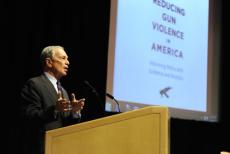Global Experts Share Data at Gun Summit

During his welcome address at the landmark two-day Summit on Reducing Gun Violence in America on January 14, Johns Hopkins University President Ronald J. Daniels called for a moment of silence.
One month to the day after the Sandy Hook elementary school massacre, more than 20 experts had gathered at the Bloomberg School to present the latest data on gun violence in the U.S. and develop consensus recommendations to help inform policy.
Introduced by Gov. Martin O’Malley, New York City Mayor Michael Bloomberg (above) opened the Summit. After outlining seven measures that need urgent attention by the President and Congress, Mayor Bloomberg proclaimed, “Enough is enough.” He charged that U.S. Congress has been bowing to the gun lobby by systematically denying the American people access to information about guns and gun violence.
“Most egregiously and outrageously,” Mayor Bloomberg said, “Congress has severely restricted the scientists at the Centers for Disease Control and Prevention from studying the epidemic of gun violence and they’ve put similar restrictions on the scientists at the National Institutes of Health. Congress has no business dictating what public health issues scientists can and should study. What are they afraid of?”
On the heels of that candid and passionate call to action, more than a dozen global experts in gun violence presented methodologically rigorous studies revealing provocative data and discoveries from research involving everything from suicide and domestic partner violence to the effectiveness of current gun possession prohibitions with regard to age.
“Gun violence is a uniquely American problem,” said Matthew Miller, MD, ScD, MPH, of the Harvard School of Public Health, not because Americans are inherently more violent than similarly developed nations, but because when we are violent, we kill—with guns.
With public funding effectively choked off, it’s no easy feat conducting evidence-based research on gun violence, Miller added: “Mayor Bloomberg gave you a good idea of what we are up against. Having studied this for the past 20 years, I still think we can make a difference. And moreover, we’re obliged to act on what we already know.”
The Summit, led by Daniel Webster and Jon Vernick, directors of the Johns Hopkins Center for Gun Policy and Research, continues on Tuesday morning. It will conclude with the release of policy recommendations at a 4 p.m. press conference. —Maryalice Yakutchik
